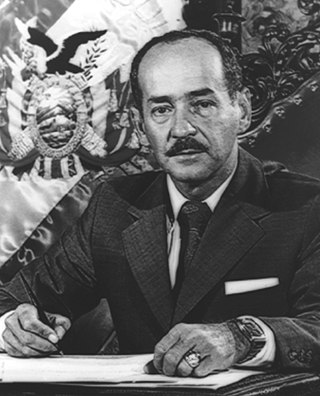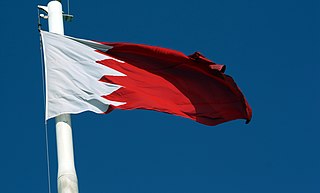Contents
| |||||
| Decades: | |||||
|---|---|---|---|---|---|
| See also: | Other events of 1971 History of Bolivia • Years | ||||
Events in the year 1971 in Bolivia .
| |||||
| Decades: | |||||
|---|---|---|---|---|---|
| See also: | Other events of 1971 History of Bolivia • Years | ||||
Events in the year 1971 in Bolivia .

Sucre is the de jure capital city of Bolivia, the capital of the Chuquisaca Department and the sixth most populous city in Bolivia. Located in the south-central part of the country, Sucre lies at an elevation of 2,790 m (9,150 ft). This relatively high altitude gives the city a subtropical highland climate with cool temperatures year-round. Over the centuries, the city has received various names, including La Plata, Charcas, and Chuquisaca. Today, the region is of predominantly Quechua background, with some Aymara communities and influences.

Hugo Banzer Suárez was a Bolivian politician and military officer who served as the 51st president of Bolivia. He held the Bolivian presidency twice: from 1971 to 1978 as a military dictator; and then again from 1997 to 2001, as a democratically elected president.

Joseph Paul Torre Jr. is an American professional baseball executive and former player, manager, and television color commentator. He has served as a special assistant to the Commissioner of Baseball since 2020. He previously served in the capacity of Major League Baseball's (MLB) chief baseball officer from 2011 to 2020. Torre ranks fifth all-time in MLB history with 2,326 wins as a manager. With 2,342 hits during his playing career, Torre is the only major leaguer to achieve both 2,000 hits as a player and 2,000 wins as a manager. From 1996 to 2007, he was the manager of the New York Yankees, and guided the team to six American League (AL) pennants and four World Series championships.

Alfredo Ovando Candia was a Bolivian military officer and political leader who served as the 48th president of Bolivia from 1965 to 1966 and 1969 to 1970. During his first term, he shared power with René Barrientos as co-president of a military junta.

Ángel Víctor Paz Estenssoro was a Bolivian politician who served as the 45th president of Bolivia for three nonconsecutive and four total terms from 1952 to 1956, 1960 to 1964 and 1985 to 1989. He ran for president eight times and was victorious in 1951, 1960, 1964 and 1985. His 1951 victory was annulled by a military junta led by Hugo Ballivián, and his 1964 victory was interrupted by the 1964 Bolivian coup d'état.

Juan Lechín Oquendo was a labor-union leader and head of the Federation of Bolivian Mine Workers (FSTMB) from 1944 to 1987 and the Bolivian Workers' Union (COB) from 1952 to 1987. He also served as the 29th vice president of Bolivia between 1960 and 1964.

The Revolutionary Party of the Nationalist Left was a left-wing political party in Bolivia. It was founded in 1963 by the labor leader Juan Lechín Oquendo and by Mario Torres Calleja and Edwin Moller in lesser roles. The PRIN seceded from the Revolutionary Nationalist Movement (MNR) in protest against Víctor Paz Estenssoro's decision to seek a third elected term as president in 1964, rather than permit then Vice-President Juan Lechín to have the MNR's presidential nomination.

Juan José Torres González was a Bolivian socialist politician and military leader who served as the 50th president of Bolivia from 1970 to 1971, when he was ousted in a coup that resulted in the dictatorship of Hugo Banzer. He was popularly known as "J.J." (Jota-Jota). Juan José Torres was murdered in 1976 in Buenos Aires, in the frame of the United States-backed campaign Operation Condor.

Rogelio Miranda Baldivia was a Bolivian general. He was also Bolivian Ambassador to the United Kingdom (1974–1978).
The history of Bolivia involves thousands of years of human habitation. Lake Titicaca had been an important center of culture and development for thousands of years. The Tiwanaku people reached an advanced level of civilization before being conquered by a rapidly expanding Inca Empire in the 15th and 16th centuries. The Inca themselves were shortly afterward conquered by the Spanish led by Francisco Pizarro in the early 16th century. The region that now makes up Bolivia fell under the Viceroyalty of Peru. It was specifically known as Upper Peru, and in 1776 was transferred to the newly established Viceroyalty of Rio de la Plata with its capital in Buenos Aires.
The Junta of Commanders of the Armed Forces (1970) was a military junta which ruled Bolivia from October 6, 1970 through October 7, 1970 and consisted of Efraín Guachalla Ibáñez, Fernando Sattori Ribera, Alberto Albarracín Crespo. This junta came to power after a coup d'etat and its removal of President Alfredo Ovando Candía.
The Junta of Commanders of the Armed Forces (1971) was a military junta which ruled Bolivia from August 21, 1971 through August 22, 1971 and consisted of junta chairmen Andrés Selich Chop, Hugo Banzer, Jaime Florentino Mendieta Vargas. This junta came to power after a coup d'etat and removal of President Juan José Torres.

The history of Bolivia from 1964 to 1982 is a time of periodic instability under various military dictators. On November 4, 1964, power passed from the elected leader of the Bolivian National Revolution, Víctor Paz Estenssoro, to a military junta under vice-president General René Barrientos. Barrientos was elected president in 1966 but died suspiciously in a helicopter crash in 1969 while touring the countryside and visiting the indigenous people of Bolivia. This led to a coup in September 1969 by General Ovando, who was overthrown in October 1970 by General Rogelio Miranda, who was overthrown a couple of days later by General Juan José Torres, who in turn was overthrown in August 1971 by Hugo Banzer Suárez. Banzer ruled for seven years, initially from 1971 to 1974, with the support of Estenssoro's Nationalist Revolutionary Movement. In 1974, impatient with schisms in the party, he replaced civilians with members of the armed forces and suspended political activities. The economy grew impressively during Banzer's presidency, but demands for greater political freedom undercut his support. He called elections in 1978, and Bolivia once again plunged into turmoil. Juan Pereda ruled for only four months in 1978, but his ascent to the presidency marked the beginning of an even more unstable period in Bolivian history, with nine civilian and military presidents in little over four years (1978–1982). 1982 marked the return to a democratically elected government, with Guido Vildoso as president.

The following events occurred in August 1971:

The Revolutionary Workers' Party is a Trotskyist political party in Bolivia. At its height in the late 1940s and early 1950s, the POR was able to gain a mass working-class following.
Events in the year 1976 in Bolivia.
Bolivia has experienced more than 190 coups d'état and revolutions since its independence was declared in 1825. Since 1950, Bolivia has seen the most coups of any country. The penultimate known attempt was in 1984, two years after the country's transition to democracy in 1982. The most recent attempted coup d'état was in 2024, led by General Juan José Zúñiga.
Events in the year 2021 in Bolivia.
The 1971 Bolivian coup d'état was led by military officer Hugo Banzer on August 18, 1971 against the government of dictator Juan José Torres.